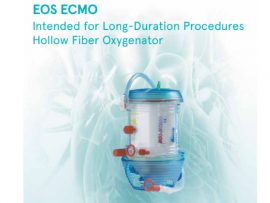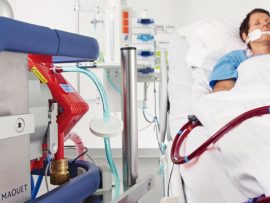Abstract Despite the increasing number of critically ill immunocompromised patients in intensive care unit, the outcome of different types of immunocompromised patients with respiratory failure managed with venovenous extracorporeal membrane..
Read MoreAbstract Extracorporeal membrane oxygenation (ECMO), an advanced life support method, was developed to treat severe cardiac and pulmonary failure in critically ill patients. ECMO was previously used to treat ARDS,..
Read MoreExtracorporeal membrane oxygenation for Chinese neonates with severe respiratory and cardiac failure
Abstract Objective We aimed to outline the experience with extracorporeal membrane oxygenation (ECMO) for respiratory and cardiac failure in neonates in our institution and compare our results with those from..
Read MoreAbstract Extracorporeal membrane oxygenation (ECMO) can support patients with severe cardiorespiratory failure presenting with hypoxia who would otherwise have not survived. Patient selection for ECMO is challenging and relies on..
Read MoreAbstract Acute respiratory failure (ARF) strikes an estimated two million people in the United States each year, with care exceeding US$50 billion. The hallmark of ARF is a heterogeneous injury,..
Read MoreAbstract Background While several studies have summarised the clinical effectiveness evidence for extracorporeal membrane oxygenation (ECMO), there are no evidence syntheses of the impact of centres’ ECMO patient volume on..
Read MoreAbstract Extracorporeal membrane oxygenation (ECMO) continues to be an indispenable tool in critical care settings, in particular in patients with severe respiratory and/or cardiac failure. The COVID-19 pandemic highlighted the..
Read MoreAbstract Extracorporeal membrane oxygenation (ECMO) is increasingly used in COVID-19-related pulmonary failure and the number of patients recovering from COVID-19 is growing. Here, we assess survival and recovery 6 months after ECMO for COVID-19. From April 2020 to..
Read MoreAbstract Objectives: Extracorporeal membrane oxygenation (ECMO) has been used successfully to support adults with severe acute respiratory syndrome coronavirus 2 (SARS-CoV-2)-related cardiac or respiratory failure refractory to conventional therapies. Comprehensive..
Read MoreAbstract Venovenous (VV) extracorporeal membrane oxygenation (ECMO) is a form of mechanical life support that provides full respiratory bypass in patients with severe respiratory failure as a bridge to recovery..
Read MoreAbstract Extracorporeal life support (ECLS) is a treatment for acute respiratory failure that can provide extracorporeal gas exchange, allowing lung rest. However, while most patients remain mechanically ventilated during ECLS,..
Read MoreAbstract Purpose: The question of whether cancer patients with severe respiratory failure beneft from veno-venous extracorporeal membrane oxygenation (vv-ECMO) remains unanswered. We, therefore, analyzed clinical characteristics and outcomes of a..
Read MoreAbstract Extended duration extracorporeal membrane oxygenation (ECMO), using dual-lumen cannulas, is being used with increased frequency to support patients, including those with COVID-19; both as a bridge to transplant and..
Read MoreAbstract The use of extracorporeal life support (ECLS) is increasingly reported in adult liver transplantation (LT). However, neither the role of ECLS in the perioperative setting for LT nor its..
Read MoreContext Poisoning may lead to respiratory failure, shock, cardiac arrest, or death. Extracorporeal membrane oxygenation (ECMO) may be used to provide circulatory support, termed venoarterial (VA) ECMO; or respiratory support..
Read MoreAbstract OBJECTIVES: Extracorporeal membrane oxygenation is a life-sustaining therapy for severe respiratory failure. Extracorporeal membrane oxygenation circuits require systemic anticoagulation that creates a delicate balance between circuit-related thrombosis and bleeding-related..
Read MoreAbstract Background Several aquatic organisms such as loaches have evolved unique intestinal breathing mechanisms to survive under extensive hypoxia. To date, it is highly controversial whether such capability can be..
Read MoreAbstract Treatment of end-stage heart failure has markedly evolved. With only a limited number of available heart transplants (24 in 2012) in our institution, mechanical circulatory support (MCS) has become..
Read MoreAbstract Background Postoperative respiratory failure, defined as ventilator dependency for more than 48 hours or unplanned reintubation within 30 days, is a costly complication of cardiac surgery that increases mortality..
Read MoreAbstract Background Single- (SL) and double-lumen (DL) catheters are used in clinical practice for veno-venous extracorporeal membrane oxygenation (V-V ECMO) therapy. However, information is lacking regarding the effects of the..
Read MoreAbstract Background Early hypercapnia is common in patients with acute respiratory distress syndrome (ARDS) and is associated with increased mortality. Fluctuations of carbon dioxide have been associated with adverse neurological..
Read MoreAbstract Objectives: Recent analyses show higher mortality at low-volume centers providing extracorporeal membrane oxygenation. We sought to identify factors associated with center volume and mortality to explain survival differences and..
Read MoreAbstract This is a review of the University of Michigan experience with extracorporeal life support (ECLS) also known as extracorporeal membrane oxygenation (ECMO). Two thousand patients were managed with ECMO..
Read MoreAbstract Differential hypoxia and the arterial mixing zone are two important factors in managing peripheral veno-arterial extracorporeal membrane oxygenation (VA-ECMO). With the aim of improving perfusion to the aortic arch..
Read More












